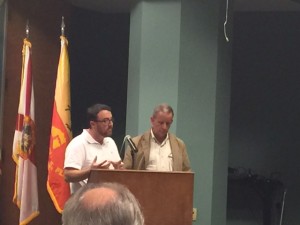Jacksonville and Miami, FL –The federal agency charged with studying and planning for dredging in the nation’s ports has faced problems in two of Florida’s biggest ports. The Army Corps of Engineers just wound up a two-year dredging project at Port Miami that was rife with environmental problems and its proposed Jacksonville dredging project has just been met with lawsuits from environmentalists.

In Jacksonville on August 11, the St. Johns Riverkeeper filed a Notice of Intent to Sue the corps because its mitigation plan for Jacksonville’s port dredging is “woefully inadequate” in terms of dollars, and doesn’t provide direct “in-kind” mitigation for expected environmental damage.
“The thing people don’t understand is that we’re not trying to stop the dredging,” said Lisa Rinaman, the St. Johns Riverkeeper. “We’re trying to get more mitigation.”
Given the problems in Miami, that may not be an unreasonable request. The National Marine Fisheries Services Department, a division of the National Oceanographic Atmospheric Administration, said damage to the coral reefs while dredging Port Miami was much greater than projected, possibly ten times more, reported CBS Miami last Tuesday.
First, the corps found that the numbers of staghorn coral, an endangered species, had been vastly underestimated and 200 had to be relocated. Then the equipment that carried the dredged ocean floor to its offshore dumping site leaked out a substantial amount, some of it dropping onto the endangered coral reef and muddying up the water, preventing sunlight from reaching the reef.
In February 2015, a reporter from National Geographic dove the reef with Miami Waterkeeper Rachel Silverstein. Scott Wyland reported they found “reef after reef caked in sediment” and handfuls of “dark, sticky residue” which is a byproduct of dredging. They found that even the newly transplanted corals were “choking in sediment.”
A New York Times story in March concluded, “The loss of coral near the Port of Miami is indisputable.” It quoted government agency reports saying the effect on corals was “profound” and “long-lasting.” The corps was not charged with any violations by enforcement agencies, according to the article. (Florida Field Notes requested information from an FDEP spokesperson on the number of inspections done at Port Miami and the results. The information has not yet been received.)
While Jacksonville doesn’t have coral reefs to destroy, SJRK has been concerned from the beginning that the corps has underestimated the damage increased salinity caused by dredging will have on wetlands, submerged grass beds where some species reproduce, and on specific species like the blue crab, shrimp, and oysters.
The riverkeeper’s lawsuit came after close to a year and a half of working with stakeholders to get its concerns addressed, only to see all of its concerns up in the air after Mayor Curry disbanded the task force in August.
The Port Task Force was called by then-Mayor Alvin Brown in March 2014. It was made up of Jacksonville business people and environmentalists to assess the validity of dredging the port from 40 to 47 feet to accommodate the new, giant cargo ships that require a deeper draft. The task force met ten times over the course of the year, hearing hours of expert testimony, and reviewing hundreds of documents and reports. JaxPort officials spoke many times about the industry and the port plans, area business people made statements on how they expected an expanded port to affect, or not affect, their business, the Army Corps of Engineers presented its Environmental Impact Study and took questions on several occasions. Environmental advocates made presentations on the existing health of the St. Johns River, and projected impacts from increased salinity caused by dredging. The St. Johns Riverkeeper spoke on many occasions about its concern that the environmental damage was underestimated by the corps and that its proposed environmental mitigation was inadequate. The corps initially said it would recommend removing the Rodman Dam, thereby restoring the original flow of the Ocklawaha River, the largest tributary of the St. Johns River. But public outcry against removing the dam caused them to change course. Instead they recommended buying preservation property at a cost of $3 million, which task force member Dr. Quint White of Jacksonville University called “useless.” The dam would have cost approximately $20 million.
After voting 8 -1 in favor of pursuing the dredging project, the task force also agreed to back the Rodman Dam removal project and to try to fund and additional $25 million in direct improvements to water quality in the river, for a total of $50 million. The task force was dismissed by the new mayor, Lenny Curry, just as they were working on funding. It is unclear if the city will pursue any environmental mitigation other than what the corps recommended.


Leave a Reply